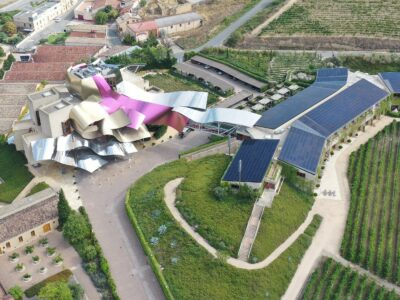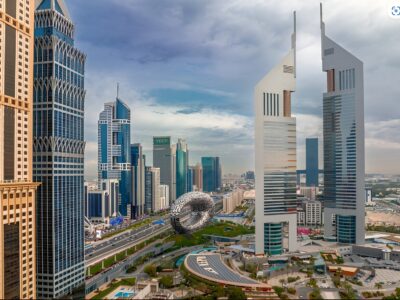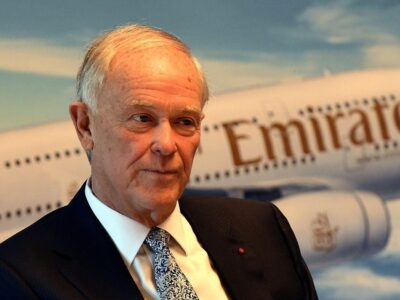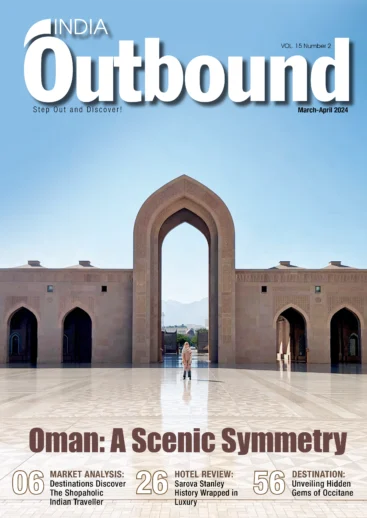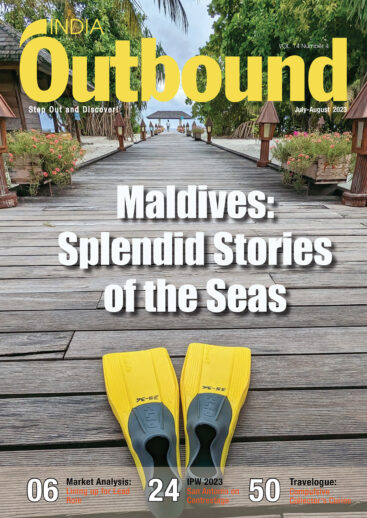
Sustainability was one of the key topics of discussion at ATM 2022 and several sessions had been devoted to it (Photo: Varsha Singh)
For Jamaica’s Tourism Minister Edmund Bartlett, one of the biggest challenges as he steadies the Jamaican tourism industry on its road to recovery has been to not only keep sustainability at the centre of his and his ministry’s focus, but also to ensure that the message not only reaches all across the industry, down to the last person employed in travel and hospitality industry in his country.
Bartlett is indeed right to be worried about rapid uptake of sustainability by the entire chain of travel and hospitality industry not just in Jamaica or even the Caribbean, but indeed the entire world as Jamaica, along with other Caribbean nations has been feeling the heat of global warming and its myriad impacts on climate change which is wreaking havoc across the world.
In a freewheeling conversation with India Outbound on Day 3 of on the ongoing Arabian Travel Market, Bartlett says it was with to make the global tourism industry capable of withstanding global shocks like the Covid-19 pandemic or the climate crisis that he had launched the idea of marking Global Tourism Resilience Day on February 17 each year. “As an industry we are increasingly exposed to several major shocks such the Covid-19 pandemic, spike in inflation across the world or the climate change. Hence, we need to build capacity in the industry so that it can handle and overcome these shocks at the earliest and with the minimum amount of disruption,’’ Bartlett tells India Outbound.
To launch the resilience day initiative, Bartlett had specially travelled to the Expo 2020 in Dubai on February 17. The launch happened at Dubai Ports World Pavilion at the Expo 2020. On the occasion, Jamaican Prime Minister, who addressed the event virtually, said that the global tourism industry’s emergence from the fallout caused by COVID-19 was a “critical determinant” of the overall pace of economic recovery worldwide, particularly among the most tourism-dependent regions, including the Caribbean.
“This necessitates a posture that understands the various threats to the industry and the need for a proactive approach to enhancing readiness and capacity to meet the challenges of the present and the future,” the Prime Minister had said.
Bartlett says that the important lessons emerging from the pandemic include the need for greater and more active commitment to behavioural changes among all stakeholders to reduce environmental, social, and human health risks.
Sustainability is also an important practice for the hotel industry as it begins to face the challenge of cutting wastes and moving aggressively toward cutting the carbon footprint. May top managers believe that going green will not only help the industry be more socially and environmentally responsible, but also help cut costs in a significant manner through adoption of water and electricity conservation, thus helping the company bottomlines at a time when the entire industry is struggling to emerge from the unprecedented losses inflicted by the pandemic.
To get there, however, the managers need the support and proactive participation of every single employee and this is what preoccupies Mohamed Awadalla, CEO of Time Hotels, a Middle Eastern chain of hotels. “Sustainability and responsible business practices are important not just at the level of top management, but it is perhaps more crucial for our operational employees to understand and imbibe the importance of the impact of climate change and what role can each of us play in combatting climate change,’’ Awadalla tells India Outbound. Awadalla adds that his company has taken sustainability very seriously right from the beginning and it is the first hotel group to be certified as eco-friendly and sustainable by the Dubai Government as well.
Sustainability is also the underlying theme in all the activities conducted by the Abu Dhabi Convention Bureau, the MICE promotion wing of Abu Dhabi Tourism Department, its director Mubarak Hamad Al Shamsi tells India Outbound. “We are fully conscious of the importance of sustainable tourism and we operate as a responsible and socially-aware company. We are alive to the challenges of climate crisis and environment-protection is key parameter on which we measure our operations,’’ says Al Shamsi.
Meanwhile, sustainability is also one of the key topics of discussion at the ATM and several sessions have been devoted to the issue. One such session looked at the role of airlines in climate change and how they are evolving to face this challenge, even as they combat the impact of Covid-19 pandemic.
One of the biggest steps towards sustainability taken by airlines has been to renew their fleet by inducting fuel-efficient aircraft as well as shift to the use of bio-fuels.
“The sustainability challenge for aviation will be around for generations to come and the physics of flight doesn’t represent an easy answer any time soon. The new airliners are poster children to demonstrate what is feasible and achievable today. To really make an impact, airlines, governments, manufacturers, regulators and policy makers – as well as consumers – need to work together to make a significant environmental impact. The Airbus A350 and the Boeing 787-9 bring up to 25 pc more fuel efficiency than their predecessors and recent ‘sustainability flights’ conducted by Etihad showed savings of 40 minutes of flight time and six tonnes of C02 on the 6.5-hour flight sector. Etihad has also been working with corporations on a green loyalty programme, ‘Conscious Choices’ where companies can offset their carbon footprint against environmental initiatives. At ATM 2022, Etihad is showcasing the interiors of the A350, which includes an all-new F&B proposition that focuses on reducing single use plastics by 80 pc,’’ says Tony Douglas, CEO of Etihad Airlines.








